#Samurai Chanpuru
Text
youtube
5 notes
·
View notes
Photo


282 notes
·
View notes
Text
Samurai Champloo Character Names
I’ve found that many websites, particularly those edited by fans, don’t use the correct definitions for the main characters’ names in Samurai Champloo. I enjoy translating Japanese kanji, so I thought I’d do a little analysis and try to clear up a few misconceptions. I’ll do some character analysis along the way.
I’ll start with Jin, because he’s easy. His name is usually translated correctly. Mugen and Fuu are much more complicated.
Jin (仁)
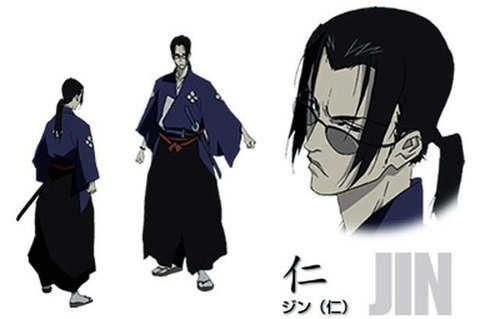
Definition:
Benevolence, compassion, humanity, charity.
Benevolence is one of the virtues of Confucianism, as well as a virtue of Bushido.
Martial arts schools that are influenced by Bushido translate the word in a variety of ways - you might see it defined as any of the words above.
I have this head canon theory that the characters grow into their names over the course of the series. When we first meet Jin, he’s not very compassionate, and he’s not really in touch with his own humanity. I’d say he’s almost as ill-tempered as Mugen, although he’s not nearly as vocal about it as Mugen is. He manages to be polite even when he’s irritated, but he usually comes off as cold and uncaring.
However, as the series progresses, he comes to embody the qualities defined in his name, particularly in his rescue of Shino, and when he starts to become more concerned with Fuu’s well-being. He commits the ultimate act of compassion and humanity when he sacrifices himself to save Fuu. I like to think that Fuu brings out his benevolence, and by the end of the series, his character traits are more aligned with his name.
Incidentally, the four diamonds on Jin’s kimono make up the kamon, or family crest, of the Takeda clan. Because of this, it’s often assumed that Jin's full name is Takeda Jin. (In Japanese, the family name comes first, and the individual’s name comes second.) I’ve written about the Takeda kamon in my glossary of Japanese terms used in my fanfiction. If you’re curious, go here and look for the word “mon,” and you can learn a little bit about Takeda Shingen and fuu-rin-ka-zan.
Mugen (無幻)
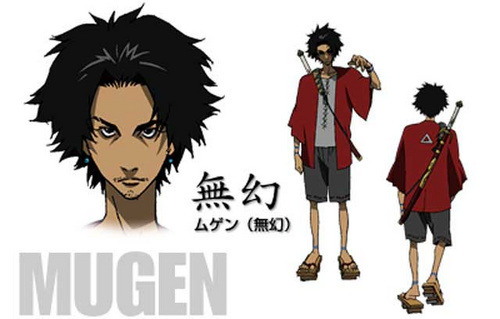
Definition:
No illusions, or not an illusion (i.e., the real thing).
無幻 does not mean infinite, however it is a homophone for a different word spelled 無限, meaning limitless, boundless, or infinite. (Infinite and infinity are not the same word - infinity is 無限大.)
The word mugen is also a homophone for these other words:
Mugen (夢幻): dreams; fantasy; visions
Mugen (無間): incessant; uninterrupted (referring to Mugen Jigoku, the eighth and most severe level of Buddhist hell)
I’ll talk more about the infinite definition in a minute. First, let’s look at the kanji.
Gen (幻) means illusion, and mu (無) is a negator meaning none, nothing, nothingness, not, un- (as a prefix), or non- (as a prefix). (If you’re a Death Note fan, you may recall Ryuk explaining to Light that users of the death note can’t go to heaven or hell when they die. They can only go to mu, nothingness. It’s the same word.)
Just like Mugen’s sword, his fighting style, his clothing, and pretty much everything else about him, 無幻 is a unique name. I’m aware that Mugen is the name of a video game character, an auto manufacturer, and a piece of software(?), however, none of these use the spelling 無幻 or its associated definition. It’s not a common word. I’ve actually never seen 無幻 written in a sentence. Try looking it up - you’ll have a hard time finding it. At best, you’ll find the two kanji separately, but even then, it’ll be hard to find 幻. That’s because the word 幻 is not usually pronounced gen.
Gen is the on’yomi or Chinese reading for 幻. However, as a stand-alone word, 幻 is usually read as maboroshi, using the kun’yomi or Japanese reading. That means you’re more likely to find 幻 in a dictionary if you search for maboroshi instead of gen. Once you find it, you’ll see that it has both pronunciations.
無 is very common - I see it all the time. It’s almost always pronounced using the on’yomi reading mu. The kun’yomi or Japanese reading is -nai which is a negating suffix attached to the informal form of verbs and adjectives. You’ll see it written in hiragana almost exclusively.
Any time you put two kanji together, you can’t mix the on’yomi and kun’yomi readings. It’s has to be one or the other for the whole word. So 幻, pronounced maboroshi by itself, becomes gen when combined with 無 to form mugen.
Given that the word mugen, spelled 無幻, is so uncommon and near impossible to find in a dictionary, I have to assume that the creators of the series made a very deliberate decision when they chose this spelling for Mugen’s name. They could have used 無限, which is much more common, but they didn’t. Because of this, I think it’s necessary that we respect their decision in choosing the spelling of 無幻 with the definition of “not an illusion,” rather than discounting it in favor of 無限 meaning “infinite.”
But that doesn’t mean infinite is irrelevant. It just means that it wasn’t the original intent.
無幻 (not an illusion) is the only kanji spelling given by Manglobe, as shown in the image above. To the best of my knowledge, they have never used the kanji 無限 (infinite). I’ve looked at a hell of a lot of resources, and I’ve never seen it used anywhere except on websites edited by fans who obviously didn’t bother to look up the correct kanji.
What this means is that the definition of infinite did not become canon until episode 18, almost two-thirds of the way into the series. Of course, now it’s baked into the collective fan consciousness as if Mugen’s name always carried this meaning. But originally, it didn’t.
My personal head canon: The fact that Mugen chooses the meaning of infinite, when the original meaning was not an illusion, is a symbol of his character development. He was illiterate up until episode 18, and he had some insecurities about it. When Fuu quizzes him on the character me (”meh”) and he gets it wrong, he’s pretty pissed off. He even blames her for making it a trick question. But then he learns to overcome this obstacle through his own hard work, and he feels a deep sense of accomplishment for having done so. He pushed himself beyond his own limitations and expanded his potential in a way that he’d never done before. Hence the definition of limitless or infinite.
However, I think the original definition still holds true. Mugen is who he is, and he’s very up front and straightforward about that. No frills and nothing inauthentic. He’s the real deal. When it comes to protecting Fuu, he can always be counted on to get shit done. I like to think the same thing was true when he was a pirate. In fact, my theory is that he might have acquired his name during his days of piracy. The word mugen did not originate from Ryukyu, so maybe it was given to him after he left Miyako(?). (Insert your personal head canon here.)
I believe that both definitions of mugen - not an illusion and infinite - can be applied to his character. Not an illusion is the essence of who he is at the beginning of the series, and he grows into the definition of infinite as the series progresses.
That being said, 無幻 is still the only official kanji spelling. If you want to spell “infinite” in reference to Mugen’s name, use the infinity symbol (∞) like Mugen does. I consider that to be canon (as of episode 18) because it’s actually shown on screen and spoken by Mugen. It’s the most accurate.
無限, on the other hand, is not canon. It is never shown on screen or spoken by the characters, and it doesn’t appear in any of the source materials.
Sorry to all those people who tattooed 無限 on themselves or bought t-shirts with it... but I guess you can choose whatever kanji spelling/definition you want. Watanabe-san is notorious for leaving certain details open to interpretation, so if you feel so inclined, go for it.
Fuu (風)

Definition:
Manner, method, style, tendency, demeanor (i.e., a person’s approach or way of doing things, or a person’s outward bearing or way of behaving)
Yeah, that’s right... the word fuu does not directly translate to wind as many fans believe.
If you thought my explanation of Mugen’s name was long and complicated, then buckle your seat belt. I’m going to talk about the definition of fuu, and I’m going to challenge the theory that fuu is short for fuukinchou.
Regarding kanji, I already mentioned the on’yomi or Chinese reading vs. the kun’yomi or Japanese reading. With some kanji characters, the different readings actually have different definitions. One kanji can represent multiple words. 風 is an example of this.
Fuu is the on’yomi reading for 風. The kun’yomi reading is kaze, meaning wind or breeze.
Kaze as a stand-alone word always means wind. Fuu as a stand-alone word usually carries the definition above (when not written in the context of Chinese texts).
However, when 風 is used in a compound to form other words, it can be read as either fuu or kaze. When read as fuu, it may or may not mean wind, depending on context. (Japanese is so context dependent that it can be maddening for a newbie who’s trying to translate straight from a dictionary.)
Here are a couple of examples where fuu means wind in a compound:
Fuusoku (風速): wind speed
Taifuu (台風): typhoon; hurricane
And here are some examples where fuu means manner or style in a compound:
Fuuzoku (風俗): manners; customs
Fuumi (風味): taste; flavor
Fuushi (風刺): satire; irony; sarcasm
Mukashifuu (昔風): old fashioned
Examples are taken from Tangorin online Japanese dictionary
So you can see, it’s not as simple as saying that 風 means wind. The real answer to the question of what does 風 mean is, it depends. Is it being used by itself, or is it part of a different word? Which word? What’s the context? Japanese is tricky like that.
What does all of this mean for Fuu’s character?
Fuu has her own distinct style, and her own way of going about things. Just look at her physical appearance - she is not dressed like a typical young woman of Edo period Japan. Her hair is lightened (my theory, because it looks like a modern hair color for girls who’ve lightened their hair), her hair is in a modern-ish updo instead of a traditional style, he kimono is bright pink - which wasn’t common back then, her obijime is a giant pink bow tied off-center - which is relatively common now, but wasn’t back then, and her fingernails are manicured with flowers painted on them.
Regarding her manner or tendencies - she has a strong personality and she’s willing to go to any lengths to accomplish her goal. She’s a young, unmarried woman traveling with two older, unrelated men, which would have earned her a great deal of disapproval and criticism in Edo period society, but she obviously doesn’t care. She’s tough enough to boss Mugen and Jin around. In one episode, she literally grabs Mugen by the back of his collar and drags him through the street. Who else could get away with that besides Fuu? She also has a natural tendency to want to help other people, which is something that neither Jin nor Mugen, nor many of the side characters possess. She’ll help a complete stranger, even when it might derail her journey. Sara is the best example.
However, despite the fact that fuu doesn’t directly translate to wind, we can’t ignore the running allegory throughout the series of the pinwheels, which are powered by wind - although, the first pinwheel we see is moved by Mugen when he flicks his fingers at it.
The color of the pinwheels is almost always yellow, and in the episodes with Sara, the pinwheels blur into sunflowers when they’re spinning. It might be a way of associating wind with Fuu’s travels to find her father, and maybe Mugen sets the whole thing off by flicking that first pinwheel before he enters the tea house.
Fuu seems to be naturally pulled in the direction of her father, even though she’s unsure which direction that is. So essentially she’s drifting on the wind until she finally gets to Ikitsuki Island. In those episodes with Sara, when Fuu sees the pinwheels spinning into sunflowers, she’s actually in the process of drifting way off course by helping Sara on her journey.
She seems uncomfortable with not knowing where she’s headed, always depending on Mugen and Jin for support and stability, but at the end of the series, she drifts off again towards an unknown future, and she finally seems to be at ease. I don’t know if that piece of her character development indicates that the wind has subsided, or if it just means that she’s content to ride it, wherever it takes her. This is all just my theory, of course. (Insert your own head canon here.)
So, just like Mugen’s name, I think it’s reasonable to say that you could apply a double meaning to Fuu’s name as well, and perhaps she grows into both definitions as the series goes on. She has her own distinct style, and she’s also drifting on the wind to reach her goal.
Now, as for the theory that Fuu is short for Fuukinchou: I call bullshit.
Fuukinchou (フウキンチョウ or 風琴鳥) is a modern word meaning “tanager,” a family of birds. Notice that it has a katakana spelling rather than a hiragana spelling. When katakana is used, it usually indicates that a word represents something foreign. And indeed, the natural habitat of the tanager family of birds is restricted to the Americas, with about 60% of the species native to South America. They do not exist as a native species in Japan, or anywhere else outside the western hemisphere.
So... You know that pretty bird in the series with the red face and breast? The one in Mugen’s memories when he’s dying? The same one that flies away during the end credits of the final episode? Not a tanager. Sorry, guys.
From that fact alone, the idea that Fuu is short for fuukinchou doesn’t make any sense at all.
Need more proof? Let’s look at the kanji.
風琴鳥 is actually made up of two words, not three: fuukin (風琴) and chou (鳥). Fuukin is a musical instrument - an organ or harmonium. Look up 風琴 on Google using the kanji, and look at the images. All organs.
Chou (鳥) is the word for bird. So fuukinchou literally means organ bird, although I think the definition is more figurative than literal. I think organ probably refers to the bird’s song, equating it with a music instrument, but that’s just a guess.
You can break fuukin down further into fuu (風), which in this context means wind (remember, I talked about using the on’yomi or Chinese reading when multiple kanji are put together), and kin (琴), meaning harp or koto. The koto is a Japanese string instrument. The harp is a European string instrument, probably introduced to Japan in the late 19th or 20th century, during or after the Meiji Restoration when western classical music started making its way to Japan.
The Japanese probably assigned a kanji character to the harp by associating it with the closest Japanese instrument. A harp functions a lot like a koto, so let’s give it the same kanji. That’s a common method of assigning kanji characters to ideas or objects for which there is no existing Japanese equivalent.
Thus, when both kanji are taken literally, the translation of fuukin is wind harp or wind koto. Figuratively, it represents the organ. It makes some sense, given that the sounds coming out of pipe organ are controlled by air or wind. Applying this word to describe a family of birds makes some sense too, if you’re talking about the sounds they produce.
So to recap, here’s the breakdown:
風 + 琴 = 風琴 (fuu + kin = fuukin)
風琴 + 鳥 = 風琴鳥 (fuukin + chou = fuukinchou)
What does this mean?
If Fuu was going to be short for anything, it would be fuukin, not fuukinchou. But I’m saying that purely hypothetically, just to play devil’s advocate, because even this is fundamentally wrong - fuu is not short for fuukin.
Just for the sake of argument, if we were to assume that fuukinchou is made up of three words, where the first word is fuu - which it’s not, like I described above, but again, I’m playing devil’s advocate - you simply cannot take a word like 風琴鳥 and decide that the first kanji is an abbreviation. Why? Because 風 is already a word on its own. You’re committing two sins here - you’re dividing fuukinchou incorrectly by breaking it into three words instead of two, and you’re trying to create an abbreviation using an independent word. Fuu is fuu is fuu. It’s not short for another word.
Not only that, but 風 is the first kanji in many other compound words, and it’s not an abbreviation for any of them. Can you imagine it if was? Fuuki, fuudobyou, fuukei, fuudo, fuuchou, fuusoku, fuuja, fuukin ... all of these are words spelled with 風. If 風 was an abbreviation, which one of these words would you be talking about?
Plus there’s the obvious fact that Fuu’s name is spelled 風, not 風琴鳥. Fuukinchou does not appear anywhere in the source materials. Not in the series, not in The Roman Album, not in Battle Cry: The Art of Samurai Champloo, and not in any interview that I’ve read.
Nope. I hate to burst your bubble, but Fuu’s name is not short for fuukinchou.
That’s the end of my spiel. Let me know what you think, and feel free to ask questions if you need clarification or more details. I’m happy to talk about it. I’d also love to hear other theories and ideas.
Thanks for reading!
44 notes
·
View notes
Text
Response to the Moral Question of the MugenxFuu Romance
This is a full response to an anonymous ask I received:
“Can I ask why you ship fuugen? Isn’t Fuu a minor and Mugen is 19.”
This is a rather...complex and loaded question. There’s multiple things to address but I’ll start simple and work up from there. I will first go into my personal feelings on why I ship the pairing, evidence, and then the more complicated concept of the character’s ages both in reality, as well as in the fictional anime. Hopefully it will alleviate some distress on the issue. If it doesn’t, and you consider the age gap morally unacceptable, then it might unfortunately serve to make Mugen out to be a morally questionable character, implied romance aside.
The Simple Question: Why do I ship it?
I ship Mugen x Fuu because it’s implied canon by the creators.
I believe strongly, and have found and provided plenty of evidence in my numerous other posts that support my belief, that Mugen and Fuu were written to have romantic feelings for one another. These feelings were never addressed, acted upon, nor explicitly spelled out for viewers. But the subtle implications of their unsaid feelings added up, episode by episode. The interviews of Shinichiro Watanabe, Ayako Kawasumi and Ginpei Sato only solidify my interpretations and findings.
The actual anime aside, here are the links to my posts concerning the interviews, if you are interested.
-Shinichiro Watanabe about Mugen’s Character.
-Ayako Kawasumi and Ginpei Sato about Fuu’s Feelings for Mugen in the Roman Album.
I adore the entire cast of Samurai Champloo, as much as by themselves as I do as a trio. I love Jin just as much as Mugen and Fuu. However, I do not see any implication of Jin having romantic feelings with either of them. His romance is canonically with Shino and his role for Fuu feels more brotherly and fatherly to me.
Personally, I am not a “crack shipper”. I am not someone who typically likes two characters and pairs them off together for my own amusement. I have nothing against crack pairings, nor their shippers, but it is not my taste. I enjoy romances that have some type of evidence or backing behind it. So it is not as if I simply ship Mugen and Fuu because I like Mugen more than Jin.
If hypothetically, all the things that happened with Mugen and Fuu happened with Jin and Fuu—if Jin saved her constantly, if Jin and Fuu had strange, intimate moments like the wrist grab scene, if Fuu jumped in the way to save Jin’s life, if Fuu cried for Jin seven times, if Fuu’s voice brought Jin back from death, if Jin gave up his sword for Fuu—well, I would not be a fan of the Mugen and Fuu ship. I’d be a fan of Jin and Fuu.
But that is simply not how the anime was written.
On that same note of liking an implied romance, I am not as interested in blatant romance stories either. Implied, subtle romance is so interesting because it leaves enough clues that one has to find themselves, and then you are able to make your own interpretations and “what if” scenarios surrounding it. This is why I enjoy the story types of, say, the Souls video game series and its related titles. (Demon’s Souls, Dark Souls, Bloodborne, Sekiro). The story lines have to be figured out, and while there is evidence and clues dropped all over, nothing is ever specifically stated. But even so, we can come to solid conclusions that are difficult to disprove, but also never fully confirmed.
Samurai Champloo spells out very little for viewers. Example: Never does the anime state what island Mugen is from. We only know it’s in the Ryukyus. But based on historical evidence, and also symbolism in the show (the paantu and the trees in his flashback) we can assume it’s Tarama-shima or another island in Miyako.
Never do Mugen and Fuu state they have feelings for one another, but it’s in subtle dialogue, numerous times. Most blatant however, is when Sara tells Mugen “It’s as if you’ve never been loved by anyone.” and then Fuu proves her wrong by saving his life by throwing her own in the way, only seconds later.
Their actions fascinate me. Both Mugen and Fuu demonstrate self sacrificial behavior for each other, and show how much they care with actions rather than words. Most of all, I enjoy the romantic trope of “love leads to a character’s redemption.” Mugen’s feelings for Fuu is what redeems him from the sins of his past, and saves him from a life without meaning and only pain, anger and hatred. These aspects of his dark character are highlighted both by the dialogue of Mukuro in Episode 13 and Sara in Episode 21. Fuu being his redemption is also symbolized in her saving him on three separate occasions. The last incident, when she calls him back from death and the Paantu taking him away, is the most symbolic of his “redemption”.
Samurai Champloo is a direct response to the cynicism of Watanabe’s previous work, Cowboy Bebop. Where revenge and the past consumes Spike, ruining his future and love, Mugen is redeemed by love and is able to face his past and press on.
Here is a fantastic article about the concept of Mugen’s love for Fuu being his redemption and also being a direct response to Cowboy Bebop.
All of this aside, because of the second comment, I’m assuming that this isn’t necessarily what you were asking.
“Isn’t Fuu a minor and Mugen is 19?”
I’m guessing you’re implying that either the romantic pairing is impossible due to their age gap, or it’s morally wrong.
I was conflicted how to answer this, at first. I know this can be a triggering topic. So I decided on providing several explanations. I hope at least one answers the question properly, or at least sheds some light on the issue.
Either it will justify why there is nothing morally reprehensible about the Mugen x Fuu romance, or, it will unfortunately show that Mugen is morally questionable, depending on how the evidence is taken.
First, at 15, Fuu is not a minor in her time period. Second, Mugen is either 19 or 20 depending on the source.
Samurai Champloo is not set in one specific year of history, as the anime is not only anachronistic, it historically takes place in multiple years that could not coincide. In essence, Samurai Champloo is not one year, but “a chanpuru of one whole era.” This era is the Edo/Tokugawa era, which includes the years of 1603-1868.
In the Tokugawa Era, Fuu is considered an adult. She is a young adult, yes, but in the eyes of everyone, she is an adult. This is both historically accurate, and is also demonstrated numerous times in the anime. Fuu’s sexualization and her being seen in a romantic way is never frowned upon by any of the characters in the entire series.
Brief disclaimer: Nowhere in my love of the Fuugen pairing or fan interpretations of the characters’ futures, do I see any sort of sexual relationship between Mugen and Fuu developing when she is 15. After they part ways, is where I like to make my fan conclusions on them meeting again when she’s older.
I also want to clarify here and now, that I’m not a supporter of a 15 year old entering a romantic relationship of any kind, let alone a sexual one in real life. I think that teens should work on themselves and not get swept away by romance and sexuality, especially frivolously. It’s irresponsible and dangerous. But, it’s also unrealistic to believe all young people will never fall in love, whether it’s fake or real. If there happened to be a man who was 5 years older than a girl and the two did develop feelings for each other, I believe nothing should be pursued between them until they are both of age.
Adulthood in the Tokugawa Era
I want to first talk about the concept of Fuu being a minor. In short, she is not a minor in her time period.
To begin with reality first, the life expectancy hundreds of years ago was much lower than now. In Japan now, the average life expectancy is in the 80s. But hundreds of years ago, it was estimated to be about 50. Women in particular had the complication of fatality from childbirth. Led makeup, childbirth, and also STDs were a huge threat for courtesans of the time period as well. Many women died in their twenties.
As for the concept of ”adulthood”, the adult age of 18 only started in the Meiji Restoration (late 1800s- early 1900s) when Japan contacted the west and emulated its practices. The age of 18 being an adult nowadays is largely based on the setup of the education system. Whether 18 is too young or too old is a matter up for debate and varies country to country.
Specifically, in the Tokugawa Era, the age of adulthood was considered when one entered puberty. This was generally 15 for a male and 12 for a female.
Here is a link to the full article on the topic of the shifting coming of age, if you are interested.
In the case of aristocratic children, such as boys raised as samurai, the Genpuku ceremony that transitioned children to adults varied in age. During the early Tokugawa era, it was 15-17, while later into the Tokugawa era, during less civil unrest, the age dropped to as low as 13. At this age, these young men could then marry and were likely pressured to do so. Marriages in the Tokugawa Era were very different than nowadays as well. Many nobles and royalty had their daughters married off at young ages such as 8 years old.Though, the sexual nature of these relationships did not develop until the girl was likely of child bearing age, which was in the teens.
Taking the historical 12 year old age into account, Fuu being 15, is then already three years into adulthood.
Fuu’s Depiction as a Woman in the Anime
In regards to Fuu’s maturity, she has no guardian, nor caretaker, which shows she is an independent adult making her own decisions. Yes, Mugen and Jin are her bodyguards, but they are not her legal guardians, because she does not need one. It is her who commands them and leads them. After they part ways, she is fifteen years old (perhaps a year older based on the time span of the anime) traveling the country alone.
She was forced to grow up very fast. Not only is she an orphan, but Fuu’s resourcefulness allows her to survive on her own. She tricks two complete strangers to escort her across Japan. But Fuu is fully functional as an adult, arguably more than Mugen or Jin in some ways. She works, fishes, cooks, sews, tends to wounds etc. Fuu is by no means innocent to mature situations either. She’s seen Mugen and Jin kill numerous people in front of her, which is traumatizing in itself.
In regards to Fuu’s sexualization,on separate occasions, there are bath scenes in the anime, showing Fuu partially nude. There are also scenes of her undressing. Morally correct or not, it is clear she was sexualized like many young anime females.
Aside from that, here are examples of male characters viewing Fuu as an adult woman, romantically or sexually.
Episode 3 and 4: Fuu is thrown in a brothel. While the legality of her being forced against her will just for the sake of paying off a debt is somewhat in question, the fact that she is 15 in a brothel is not. Brothels were not an undercover organization. It was completely legal in Tokugawa Japan, and Fuu being 15 as a courtesan was not illegal. When an ugly rodent man buys her, it’s served as comedy.
Episode 5: Fuu becomes a ukiyo-e model, the backwards beauty, for Moronobu Hishikawa, who was a real historical figure. This grown man, probably around Jin and Mugen’s age or maybe older, also is not considered a creep for his attraction to her. In fact, it’s not even considered wrong that he paints a nude picture of a 15 year old. Again, because she’s deemed a woman in this time period.
Episode 8: Nagamitsu, who is leagues older than Mugen and Jin, asks Fuu to become the “harem of his heart”. He is attracted to her, sees her as a younger version of his wife when he first met her, and even asks her on a date, to which she accepts. This entire interaction is played off as comedy, and not that he’s some creepy grown man attracted to a minor. More like, he’s a bumbling buffoon. His two sidekicks, the beatboxer and Ogura do not intervene, nor make a comment that it’s wrong he is interested in a 15 year old when he’s in thirties or forties. Because quite simply, in this time period, it’s not wrong.
Episode 16: Okuru tells Fuu that “a woman with a healthy appetite is a good woman” when she is devouring fish.
If you stand firm that it is still morally wrong and all these characters were creeps for being interested or saying these words to a 15 year old, that is fine. If you think it is morally wrong to ship Mugen and Fuu because of the age gap, and refuse to believe that the two are an implied romance, that is fine too. I can’t convince everyone.
However, I will make the counter argument then, that liking Mugen as a character means liking a morally questionable character. Romance and feelings aside, the reason for this is simply how he treats and talks to Fuu.
Mugen’s Questionable Dialogue to Fuu
If shipping them is wrong, then what Mugen directly says and does to Fuu is just as wrong. In my opinion, it makes it weirder if he doesn’t develop feelings for her.
Episode 2: In the original Japanese dub, Mugen tells an unconscious, intoxicated Fuu that he’s going to rape her. “Okasu kureru” is the dialogue.
The English changes this to “Let’s strip her and dump her.”
Episode 11: When Fuu asks why Jin needs to go see a woman when she’s around, Mugen then responds “Because you’re flat chested”, not to be confused with “You’re a child.” When she says her kimono makes her look slender, Mugen calls her a liar and then says “Show me.” He asks Fuu to undress for him and show him her breasts...
Episode 20: Mugen stands up naked for Fuu in the hot spring even though she’s clearly flustered. Exposing oneself to a minor is an offense in the modern era. But he doesn’t stop there. He berates her, and then peeks his head out to look at her naked too.
All of these examples are meant as fluff and comedy too, no matter how offensive they can be. It also implies his attraction, interest and his consideration that she is indeed a woman. This is then furthered in his dialogue with Jin.
Episode 12: When they read Fuu’s diary, Mugen asks the odd question to Jin. “Man to man, what do you think of her?” This “man to man”, implies Mugen wants to know how Jin feels about Fuu as a woman.
As for a debatable canon example, I have the need to bring up the Samurai Champloo: Sidetracked video game on PS2. In Japanese, it is entirely voiced by the same cast as the anime: Kazuya Nakai, Ayako Kawasumi and Ginpei Sato. In English, Mugen is not Steve Blum, but Fuu and Jin are the same voice actors as the anime: Kari Whelgren and Kirk Thornton.
In it, Mugen develops an attraction to a girl who looks nearly identical to Fuu: brown hair in a ponytail, big brown eyes, pink kimono, three hairpin beads. The kicker is her name is Yuu. The even bigger kicker is that she is younger than Fuu.
Here are the links to the scenes. Japanese audio is much better, as a warning.
Link to English, Fuu catches them alone and tells Jin “I had no idea Mugen was a cradle robber!”
Link to Japanese: Fuu calls Mugen a “lolicon”.
When the girl asks “Do you like me? You can lie if you want.” he tells her:
Link to Japanese: “Suki da. Uso jane.”
Link to English: “I like you. I ain’t lyin’.”
And the two share a kiss, before she dies. Worth mentioning, Fuu also admits to being jealous about all this and a fortune teller tells Fuu that this is her “heart talking.”
While debatable canon, the video game still highlights this concept that Mugen will even like a girl younger than Fuu (anywhere from 12-14), so long as she resembles Fuu.
If we pretend for a moment that Fuu is indeed a minor in her time period, then that makes Mugen’s actions and comments out to be even worse. Not only is he a pervert, but he’s then a pervert flirting and making sexual comments about a ”minor”.
Underaged Girls and Age Gaps in Other Japanese Romances
If you still believe that there is something morally wrong, regardless of the time period it takes place in, I have more modern examples in media.
Modern Japanese shoujo manga and anime (shoujo being a genre directed at teenage girls) is rife with romance stories of older guys with younger girls. It’s not frowned upon in Japan, and even for its readers in the west.
I will give you some major examples I can think of, off the top of my head.
Inuyasha: Inuyasha and Kagome. Inuyasha is over 150 years old (not counting the other 50 years he was comatose). Yes, he ages slower as a half demon, but that is still 150 years of experience in life. Kagome meanwhile, is 15 years old and does not come from the Sengoku era. She’s from the modern era. If one wants to argue that Inuyasha doesn't count because every decade for him is one year, meaning he’s supposed to be “15 in human years”, then there is the matter of Miroku. Miroku is 18 years old, and fondles not only Kagome who is 15, but Sango who is 16. And he and Sango later become a romance.
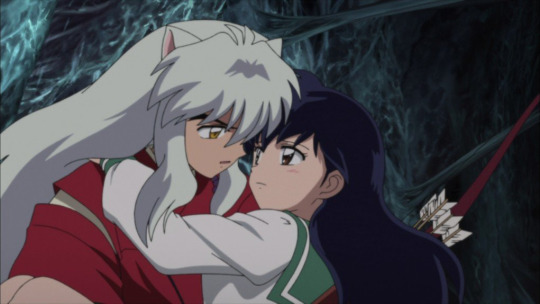
Shugo Chara: Ikuto and Amu have an age gap of 17 and 12. While there is a love triangle element, it is debatable that Ikuto is more her true love interest in the manga. This takes place in the modern era.
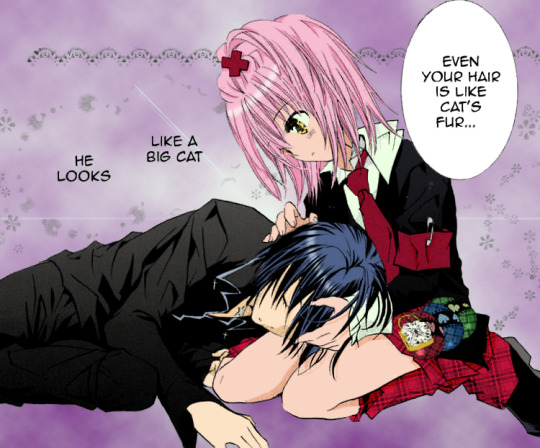
Dengeki Daisy: Kurosaki and Teru have an age gap of 24 and 16. This also takes place in the modern era.
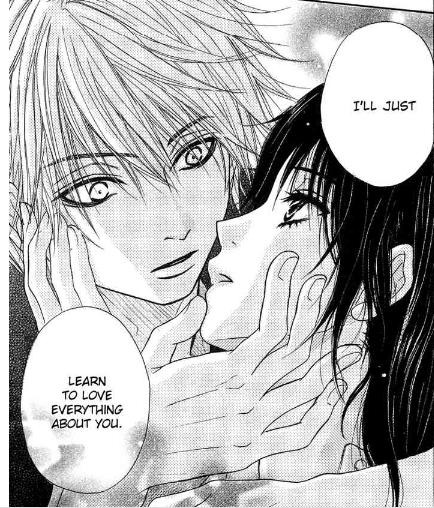
Incidentally, all of these aforementioned romances share some parallels to Mugen and Fuu in some way. Whether the guy is argumentative with the girl, a homeless wanderer, antagonist by nature, teasing about her lack of a figure, a bodyguard/protector role etc.
These are just a few of the more pure Shoujo examples directed at young girls.This does not include age gaps between characters, or underaged girls in anime meant for men or adults in general. They can get far more morally questionable, in my honest opinion. Mugen and Fuu barely scratches a surface. There is clearly a cultural gap between Asia and the West and the concept of age gaps, regardless of one’s personal moral stance on the subject.
Mugen and Fuu’s Actual Age Gap and Maturity
In the Tokugawa Era, their age gap of 4 to 5 years is incredibly small. Even nowadays, that age gap is very small, if Fuu was a legal adult in modern times.
Tsuru-himegimi, the real daughter of Shogun Tsunayoshi was 8 years old when she was married to her husband Tsunanori of Kii, who was 12 years her senior.
As for the anime’s depiction of them, there was never a sense of “Fuu is child. Mugen is a man”. It always felt like the two were in a similar age bracket.
I must ask the question, if Fuu or Mugen’s ages was never revealed, would it change the context of the story at all? If Fuu was older, would it change it? Personally, I don’t think so. In this case, because she is both physically developed and also deemed a woman in the anime and historically, it changes nothing.
Their interactions, their bickering, their attitudes, and the way Mugen yells at her, and the way Fuu reprimands him, it always felt like they were similar. They both exhibited many immature, innocent qualities, as well as adult qualities. It was Jin who had a more mature demeanor, being the calm, responsible one, who would rather not intervene with their nonsense. This is another reason why I see Jin as a father figure to Fuu: a representation of the samurai who smells of sunflowers that she did not have growing up.
These images here show their similarities in behavior quite well. And there are many more examples.
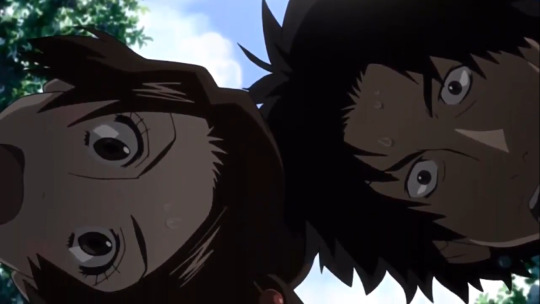
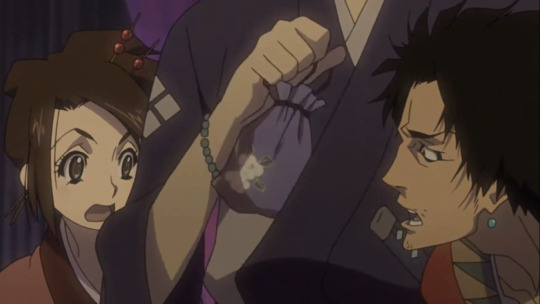
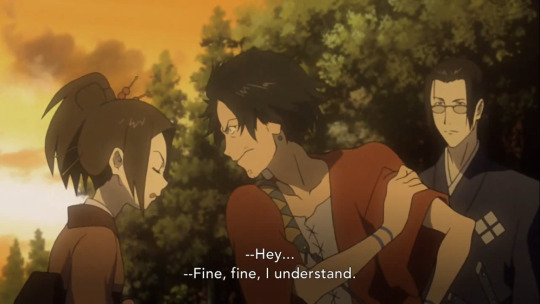
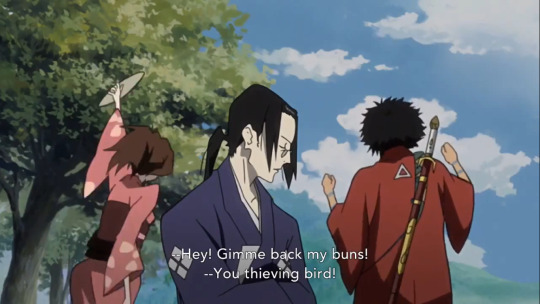
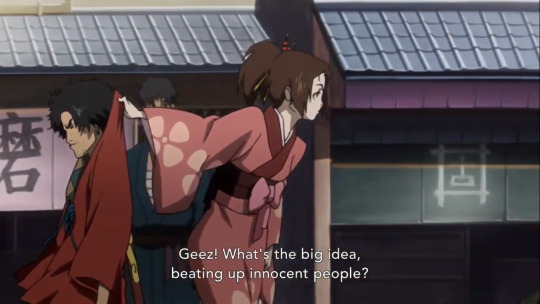
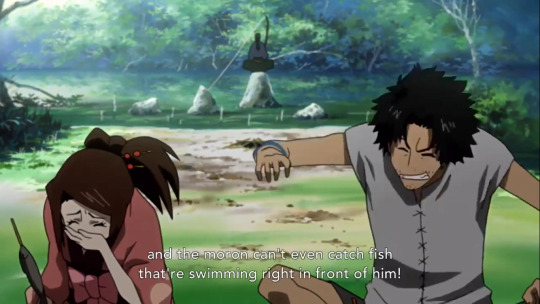
Conclusion
A good, well developed character is not a perfect one. There is no denying Mugen is flawed, morally questionable and sometimes straight out an antagonist. He steals, he kills, he was an ex-pirate who likely raided and pillaged… Realistically, he would have no qualms about being attracted or developing feelings for a woman who is 4 or 5 years his junior, let alone the other crazy stuff he’s done. Especially when, in their time period, there is nothing wrong about it at all.
Regardless if his morality is in question or not, what makes the implied romance so interesting is the fact that he didn’t act upon anything sexually with Fuu. His actions towards her were selfless, and Mugen developed greatly by the end. But because of his actions and words,and jealousy, it does not come off as simply a sibling or familial relationship that the two have. This differs from how Jin and Fuu interact.
Most importantly, Fuu serves as the catalyst for Mugen’s growth and redemption of his sins. Unlike Jin, Mugen saves Fuu time and and time again, making him her hero, despite being seemingly an ex-criminal that only works in self interest. Jin did not require this change, as he was always an honorable samurai from the start.
Both men found purpose for different reasons.
Mugen needed love.
Jin needed duty.
I think that covers everything. Well, unless your question is simply why do I ship them when the characters are young and I’m older than them.
As of the time of making this post, I am a 23 years old woman. The first time I ever set eyes on the anime, I was 8 or 9 years old. As a kid, I had my first innocent, childlike suspicion of a romance between them when Mugen first went to save Fuu from the “bad place”, being the brothel in episode 4 without any reason to, while Jin didn’t. Also, he saved her in Ep 1 and 2 and Jin didn’t.
The first time I got to watch the whole anime, I was 13 and saw the full story play out. And at that point, I was more convinced. Over the years, I rewatched, looked into a lot of the history and symbolism used in the anime, analyzed the episodes, and I became more convinced. I shipped it when I was Fuu’s age of 15. I shipped it when I was Mugen’s age of 19/20. And, I will likely continue to cherish the beautiful story of Samurai Champloo and the implied subtle romance of Mugen and Fuu for years to come.
Perhaps it is a reminder of the purity and innocent nature of love for me. These two did more for each other, cared more for each other, and were more entertaining with each other than so many cliche, blatant romance stories.
#samurai champloo#fuugen#mugen and fuu#Mugen Samurai Champloo#fuu samurai champloo#shinichiro watanabe
68 notes
·
View notes
Photo

#Samurai Champloo#Samurai Chanpurū#サムライチャンプルー#Samurai Chanpuru#anime#Anime#gif#gifs#GIF#anime gif#Fuu#フウキンチョウ#fuukinchou#フウ#Fu#風#Fū#dxx90#Dxx90#アニメgif#アニメ
25 notes
·
View notes
Text
900 Sam Cham Fans!
Thank you to my followers.. I'm glad to see the love for Samurai Champloo going strong after all these years since the anime ended. I definitely notice you regulars and check out your blog from time to time ;) Like or reblog this and I'll leave a comment on your page! Also, feel free to send me your suggestions for my blog! Thanks ^_^
3 notes
·
View notes
Text
Samurai Champloo Character Measurements
The height of each character, as shown in the concept art by Manglobe, and weights for Mugen and Jin, from a scanned image of a Japanese magazine.
Mugen (ムゲン)
Height: 177cm (~5′10"), plus 3cm for his geta = 180cm (~5′11") overall
Weight: 59kg (~130 lbs)
Jin (ジン)
Height: 180cm (~5′11")
Weight: 56kg (~123.5 lbs) - This can't be right, can it? This boy is way too thin!
Fuu (フウ)
Height: 158cm (~5′2″)
Weight: Not given
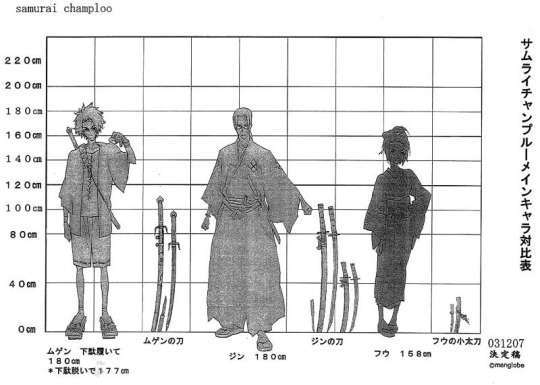
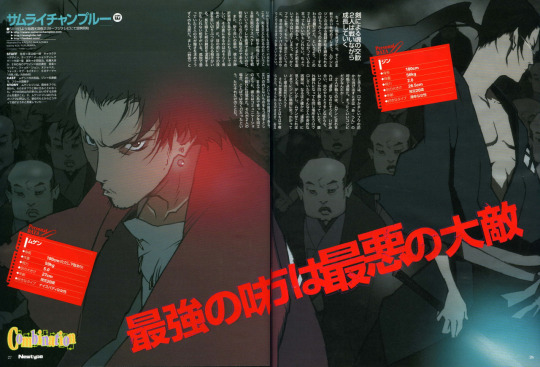
Additional information from this magazine
This stuff seems kind of random (shoe size? really?), but they gave us the information, so I might as well translate it.
Mugen
Eyesight: 5.0 (U.S. 20/17, assuming 5.0 is based on the 6m scale)
Shoe Size: 27cm (U.S. 9.5, Euro 43)
Age: Estimated 20 years
Type of women: Nice body
Jin
Eyesight: 2.0 (U.S. better than 20/10, assuming 2.0 is based on the 6m scale)
Shoe size: 26.5cm (U.S. 9, Euro 42-43)
Age: Estimated 20 years
Type of women: The kanji is really hard to read, but I’m pretty sure it’s this: 薄幸, meaning misfortune or ill-fated. I suppose that’s an accurate description for Shino.
Fuu
M.I.A. Poor girl doesn’t get any love. (Or maybe I’m missing a page from the magazine.)
Resources
Kanji translation:
http://tangorin.com/
Height conversion:
http://www.calculatorsoup.com/calculators/conversions/heightftcm.php
Weight conversion:
http://www.kg-to-lbs.com/
Visual acuity conversion:
http://dicom.nema.org/dicom/2013/output/chtml/part17/sect_RR.2.html
International men’s shoe size conversion:
http://shoes.about.com/od/sizemeasurementcharts/a/mensintsize.htm
Roman Album: Samurai Champloo (book)
Published 2007, Dark Horse Comics
(The Roman Album also states that Mugen and Jin are each estimated to be 20 years old.)
30 notes
·
View notes
Note
I have been reading your fuugen monster of a fic (which hands down is the landmark fanfiction of this fandom) and i just wanted to say that i am so unbelievably in awe of your talent, and bain, and skills and reading that story genuinely has changed my view of fuugen and made it so much more...real. I cannot thank you enough for all that you have done for this fandom and yet all i can do is try so; Thank you. So so much 💕
Wow. ...Please excuse me for a moment. I just need to grab a glass of water.
... *wipes eyes with tissue*
Huh? Oh, I um...spilled the water. In my eyes. Ahem. Where was I? Ah, yes.
I'm glad that my fanfic has allowed you to see Fuugen in a new light. More "real" as you said. Actually, that's why the story features so many flashbacks to the anime in key moments. Though, it's assumed that Mugen and Fuu are falling in love as the journey goes on, the flashbacks reveal that they already were in love all along in the anime. But circumstances always worked against them before...like Fuu getting thrown in a brothel in Episode 4...and Mugen going back to save her, but she never finds out. So now, being thrown in a brothel AGAIN in Chapter 17-19, we see a familiar occurrence, yet with all new circumstances and outcomes for Mugen and Fuu. So I guess I'm trying to not only tie up loose ends (like Yatsuha and Hankichi in Chapters 13-15) but also untying the knots that Mugen and Fuu missed out on in the anime.
Finding the Four Eyed Samurai...WITH YOU? still requires a LOT of work. There's still 15 chapters to go. And I'm sure you noticed that the earliest chapters are...well, written VERY poorly by comparison of the later ones.
I originally started writing it 9 years ago, when I was 13/14. Thank you for carrying on through the earliest ones. Even some of the later ones need work too. The only ones that are currently in my mind, "done" with need of minor fixes, are Chapters 13-19 and 32-45. Everything else, particularly 1-12, needs overhauls.
Since Chapter 45, the end of the Tsuru and Giri arc, I have not been writing Chapter 46. Instead, I have dedicated time to rewriting from the ground up.
Currently, I'm working on the rework of the "ghost arc", which is now a whole episodic story, with side characters, a mystery plot, and somehow, more Fuugen highlights. Fuu and Mugen sharing a bed? Well, that's about the extent of what has stayed intact, but for a far more logical, and plot driven reason, if you can believe that. No pointless fluff anymore. Not in this fanfic. But you'll have to wait and see how this happens XD
On fanfiction right now, it's still the same two chapters from all those years ago... But I am extending it to a four-chapter story. I have the first two chapters of it completed, and working on the third. However, even when I finish all four parts, I can't post it on the website, as some of the details in it retcon other things in earlier chapters.
(If anyone else is interested in reading the rewrites before they get posted on the website in May or June, please let me know! I have so much content finished that I can't post!!)
Most majorly, Mugen and Fuu in the retcon will meet in Yokosuka. Not Edo. This is because the ghost chapters will take place in Edo, as part of historical accuracy and reference to real history and mythos of the ghost this arc is being based off of. Yokosuka chosen as the retcon place they reunite in, is in reference to "Letters from Yokosuka" by Nujabes. It is also in reference to the fact that Yokosuka is known historically for where Commodore Matthew Perry from America first landed to open trade with Japan: a nod to the chanpuru concept of American Hiphop meeting Japanese history.
Because of these certain retcons, it sucks that I have to wait until i finish ALL the retcons, instead of arc by arc, like I'd initally been doing. I'd already posted the brothel arc rewrite, and then the Yatsuha arc rewrite after. But now...I can't post the ghost arc. It may take until May or June to have them all done...
If you ever wonder if rewrites have been posted yet, check out my Fanfiction profile, where I post what I have recently finishing revising.
Aside from the rewrites though, an all new will be posted after that.
Chapter 46 will star Jin. He hasn't been featured since Chapter 28, when Shino was confirmed pregnant, and we meet the two boys, Norio and Mirai. His little makeshift family and new way of life will be the focus. Strangely enough, writing about him has gotten me...emotional?...Perhaps because he is still separated from his best friends... And, well...the end of the last arc just happened, and he has no idea what his friends are going through. He will be in his own state of distress for reasons he can't quite place. It's almost like they're all still connected, even when they're apart.
But anyway, I work on this fanfic every single day now, whenever I have free time. I remember, for nine years I took suuuper long hiatuses. But, ever since Covid-19 struck, inspiration and motivation struck me too.
Everything was getting so crazy in the world, and I just wanted to give a little glimmer of happiness to readers who were still waiting. In the darkest, most hopeless moments of my life, there were so many readers that sent me such kind reviews and comments about the story.
But during 2020 and now, my life is ironically at its very best. So...I wanted to return the favor to everyone who had no idea what their words helped me persevere through. I am so blessed to still have such supportive and enthusiastic readers, even after all these years. If there is ever month long hiatuses (like now. I havent updated since December), know that I am actually working on it obsessively.
Your words mean so much to me. More than you will ever know. From the bottom of my heart, thank you.
OH BOY. I need water again. What a long tangent this turned into.
I hope that, no matter how long it takes, you will continue to read and enjoy this journey to find the Four-Eyed samurai to the very end. ...More importantly, will Mugen ever get his 100 damn dumplings?!
In the meantime, I hope you enjoy my many Fuugen proof posts on Tumblr as well!
#oops spilled more water in my eyes again#ITS RAINING I TELL YOU#WHAT DO YOU MEAN THERES NO RAIN#WHAT DO YOU MEAN IM INSIDE THE HOUSE#fuugen
27 notes
·
View notes
Video
youtube
I freaking LOVE this anime and this music. Nujabes is just music for my soul. If you love anime and haven't seen this, please do yourself a favor and make time to watch it.
7 notes
·
View notes
Text
Jin: By starting this pointless squabble, you’ve done nothing but reveal just how vast your stupidity is. Please refrain from these moments of self-grandeur.
Mugen: Run that by me again?
19 notes
·
View notes
Text
Jin: Why do you always feel it’s necessary to stir things up?
Mugen: Can’t help myself. Guys like that just put a bug up my ass.
1 note
·
View note
Text
Mugen: Sorry dude, but I got a thing about bein’ told what to do.
Jin: Don’t cause a commotion. Step on it and be through.
Mugen: Nah, I ain’t gonna do it.
Jin: Then don’t step on it.
Mugen: Well, now that you told me not to do it, I do wanna do it!
19 notes
·
View notes
Text
Fuu: Now let me get this straight. Are you saying you can’t read?
Mugen: *Stands up* This one here is no, and so is this one, and this one too. So you see, I can read just fine.
Fuu: What’s this one, then?
Mugen: Mmm… no, I guess.
Jin: It’s me.
Mugen: Damn! You little bitch, that was a trick question!
#samurai champloo#Samurai Chanpuru#mugen#Mugen Samurai Champloo#jin samurai champloo#fuu samurai champloo
14 notes
·
View notes
Text
Mugen: We hit potjack!
Fuu: That's jackpot.
Mugen: All I knows now is that we're filthy bitch.
Fuu: Filthy rich!
Jin: I hope you're doing that deliberately.
#Samurai Champloo#samurai chanpuru#jin samurai champloo#fuu samurai champloo#Mugen Samurai Champloo#mugen
13 notes
·
View notes
